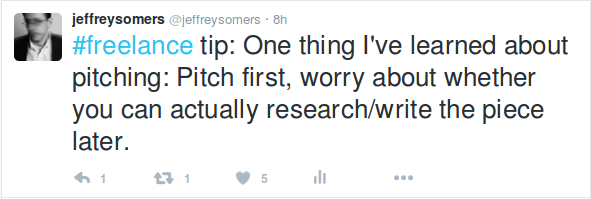When you’re a writer in 2017, you spend approximately 109% of your time thinking up clever things to Tweet in the vague, vain hope that about forty million people will Retweet it and thus declare you Cool. I’m not 100% certain how being Cool = $$$, but I am assured by everyone it can happen, and so I keep doing it.
Recently, I sent out this Tweet:

WISDOM
It got some play, and I was contacted by writers who thought this was a pretty incredible suggestion. What happens, they wondered, if you sell the pitch but can’t actually write the piece? What if you can’t support your thesis?
Look, freelance writing can be exhausting in the modern age because we’re writing short, punchy Internet essays with a short shelf life. And our corporate masters are insatiable, always eager for more content with which to attract those sweet, sweet clicks. Pitching fast and furious is the only way to make a living; I probably wrote about 500 freelance pieces last year alone, each and every one of them (with perhaps a dozen exceptions) stemming from a pitch.
That kind of volume means you can’t dawdle about wondering if a pitch idea is good (your editors will do that for you) or possible. The best way to pitch is to pitch first and think about it later, and here are three reasons why:
- The Doubt. If you think of a great idea for an article but pause to wonder about its feasibility, you will talk yourself out of it. You’ll convince yourself it isn’t that clever, that you’ll never find any supporting information or examples, that no one will return your phone call or email. And then a month later you’ll see a similar idea on another website and you’ll kick yourself. I’ve talked myself out of great ideas and I have always regretted it.
- The Speed. You are not the only person furiously pondering things to write about, and great ideas for posts and articles have an odd way of popping into many heads simultaneously. In other words, while you’re researching whether you can even pitch this idea, someone is pitching this idea.
- The Challenge. Don’t play it safe. Yes, freelance writing is for profit—but it should be for fun, too. Got a crazy idea you convinced an editor to buy? Have fun trying to make it work.
In Event of Emergency
All well and good, that sense of adventure and the swagger of pitching without fear, but in all seriousness—what do you do if you brazenly pitch a weird idea, get the green light, and then realize you can’t find much information to work with? WHAT THEN, SOMERS YOU ARROGANT ASS?
First off, that rarely happens. If you can conceive of a pitch idea, then it’s within the realm of the possible. And part of writing anything, on any subject, is creativity. If you’re having trouble digging up material for your pitch, get creative. If you can’t get creative in these situations, freelancing may not be your ideal career.
If that doesn’t work:
Widen your search. Don’t be afraid to get a little loose with your interpretation of your own pitch. Look back further in time, or allow for a bit of inconsistency in your examples.
If that doesn’t work, tweak. Contact your editor and see if you can twist the pitch a little to fit what the research is telling you, or just go ahead and tweak the premise. Usually small deviations aren’t a big deal.
Now, don’t get me wrong; a big caveat here is not to pitch wildly insane ideas—you should have some expectation that you can back up your pitch. “Pitch First, Think Later” simply means you don’t need to do all the research and legwork first.
